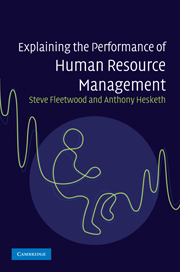Book contents
- Frontmatter
- Dedication
- Contents
- List of figures
- List of tables
- Preface
- Acknowledgements
- Part I HRM and organisational performance today
- Part II Meta-theorising the HRM–P link
- 3 The state of contemporary research on the HRM–P link
- 4 Scientism
- 5 Prediction, explanation and theory
- 6 Critical realism
- Part III Reflexive performance
- Notes
- Bibliography
- Index
6 - Critical realism
a meta-theory for analysing HRM and performance
Published online by Cambridge University Press: 05 July 2014
- Frontmatter
- Dedication
- Contents
- List of figures
- List of tables
- Preface
- Acknowledgements
- Part I HRM and organisational performance today
- Part II Meta-theorising the HRM–P link
- 3 The state of contemporary research on the HRM–P link
- 4 Scientism
- 5 Prediction, explanation and theory
- 6 Critical realism
- Part III Reflexive performance
- Notes
- Bibliography
- Index
Summary
Introduction
Would you choose a pneumatic drill to clean a window? Probably not, but the important question is: why not? You would not choose a pneumatic drill to clean a window because you would almost certainly, if implicitly, consider the nature of glass and conclude that a pneumatic drill would be an inappropriate tool to be applied to this material. In other words you would start with an enquiry into the nature of the phenomena under investigation. That is, you would start with ontology. You would then choose a tool appropriate for dealing with the phenomena in question; to clean a window you might choose a damp cloth. This simple example suggests that we should start with ontology and then choose or design a ‘toolkit’ appropriate to the phenomena under investigation. The term ‘toolkit’ is, of course, metaphoric, and whilst it can refer to the physical world, we are more concerned with the social world, and so our ‘toolkit’ will be conceptual, in this context, meta-theoretical.
Empirical researchers working on the HRM–P link do not, however, start with ontology. Instead, they start with an ‘off the shelf toolkit’ in the guise of scientism, the deductive method, and its quantitative, empirical and statistical research techniques and apply this ‘toolkit’, without questioning its appropriateness. Purcell and Kinnie, whilst perhaps not being as thoroughgoing in their critique as us, nonetheless notice something similar:
Thus, the usual steps in research, of theory determining the research questions and hence the choice of method, have been reversed. Methodological considerations have determined what questions can be asked while factors beyond the reach of the chosen method, however important, have been ignored.
(2007: 540)- Type
- Chapter
- Information
- Explaining the Performance of Human Resource Management , pp. 205 - 264Publisher: Cambridge University PressPrint publication year: 2010



